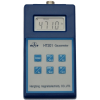What is Gauss?
Gauss is a unit of measurement that is used to describe the strength of a magnetic field. Gauss is named after
Carl Friedrich Gauss, a German physicist and mathematician who developed a way to measure the strength of a magnet in relation to mass, length and time.
Why is Gauss Important?
People who are purchasing magnets, including rare earth magnets and neodymium magnets, online can determine how strong the magnet that they are purchasing will be by using the Gaussian unit measurement as a reference. Examples of the Gaussian unit measurements

can help consumers understand the strength of the magnets that they are buying:
- The natural magnetic field of the Earth is equal to .31 to .58 gauss
- Most refrigerator magnets have a gauss rating of 50
- The strength of a small magnet made of iron is equal to about 100 gauss
- Rare earth magnets can have a gauss rating of 12,500 or more
More Information About Gauss
Neodymium magnets are the strongest type of magnets that are permanent in nature. These magnets can have a gauss rating over 14,000. Medical magnets that are used in conjunction with MRI machines have a gauss rating between 20,000 and 70,000. Stronger magnets are only available in research labs where scientists create magnets with gauss ratings up to 450,000. To learn more about gauss ratings, click
here.
Additionally, it is important to remember that the strength of a magnet can be impacted by its size. While the gauss rating will not change whether a magnet is big or small, the magnetic field will shrink or grow according to the size of the magnet. This means that larger magnets are better at attracting items from a greater distance.
Magnets cannot gain strength when combined with other magnets. For example, a magnet with a gauss rating of 500 will still have the same rating if it is attached to an identical magnet. The magnets will not combine to create a magnet with a gauss rating of 1,000. However, the magnetic field will grow in this instance.
Keep Up With The Latest Magnetic News With Apex Magnets
As you can see, there’s so much to know about magnets! Check out our
FAQ for answers to some basic magnetic questions as well. As always, we’re here to help answer any questions you may have about magnets.
Just give us a call or email us!
 can help consumers understand the strength of the magnets that they are buying:
can help consumers understand the strength of the magnets that they are buying:

